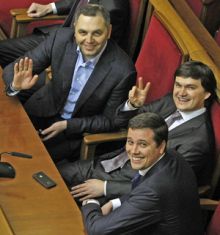The members of the Party of Regions are actively pushing forward, amendment after amendment, their draft Code of Criminal Procedure. All warm feelings to the opposition aside, they offer quite reasonable changes. But no amendment offered by the opposition stands any chance. Only the pro-governmental ones are approved. In this demonstrative situation the atmosphere around the approval of the draft law is quite significant. We remember that verbally the government calls everyone to dialogue, society and the opposition, but in reality we have nothing but demonstration of power.
“On the whole, we have considered nearly 4,000 amendments by now. Too bad, we can trace only one tendency, which is extremely disgraceful for democracy and the Presidential Administration. Everything the Committee has done, although not much, it did to improve an absolutely nonsensical, unbalanced draft law, signed by the president. The amendments which have been taken into account by the Committee, partially or fully, improve the draft law. But the scheme works as follows: no matter who is present, except for a couple of MPs from Portnov’s group, all the amendments previously taken into consideration by the Committee are put for vote and thus ‘destroyed,’ because nobody votes for them.
“The amendments offered by the opposition and even by the majority, which have been accepted – some of them were rejected, even the one offered by Oliinyk who is now at the tribune, he had to put his amendments for vote, and nobody votes for them either. This is a paradox. This is the key line pursued by the Party of Regions, pro-government majority and Presidential Administration. It is as follows. All amendments are accepted in a non-constitutional way, I mean one person votes for four or five others. The same thing happened today. According to the way of voting, the draft law should be recognized illegitimate, taking into account the ruling of the Constitutional Court. There is also a tendency of preserving the text from the first reading in full, as it was offered. And the desire to adopt the draft law on the elections is obvious; they want to consider it at any cost.
“Why is it so? Because the elimination of fundamental democratic foundations, which were present in the old Code of Criminal Procedure, is taking place now. The old Code has been amended 34 times in the past two years. It would make no sense to say that it has not been reformed. On the whole, since the moment of adoption, the old Code has been amended and supplemented 206 times. That is why it was absolutely adapted to the present-day life and we could have worked with it, not be in a hurry, like we are today. At the same time they use as an excuse the approval of a European expert of this Code, praising it high. Apparently, people read only the initial articles, including the norms and principles. When you start reading this, you come to like it. They say about equality, taking into consideration the international experience, and rule of law. But when you look at the articles of the special part, it says about the strengthening of the role of political police, it will be allowed to investigate into 75 types of corpus delicti. In Europe, such practice is condemned. The Code totally ignores the clauses of the paragraph 9 of the transitional provisions of the Constitution on creation of pre-trial investigation system. It mentions only the bodies which used to perform the pre-trial investigation: the police, Prosecutor’s Office, Tax Inspectorate, and Security Service. The body, about which we have no law whatsoever, the anti-corruption agency is added though.
“But the most reactionary amendment remains the blow against the Constitution and the ruling of the Constitutional Court dated 2000, which allowed the defendants to freely interpret the Article 59 of Criminal Code. Not only a person with a Ph.D. in Law, working as a lawyer at any enterprise, trade union, or civic human rights organizations, is forbidden to defend in court. None of the relatives are allowed this either. Neither can a person with a lawyer’s license, but involved in other kind of business, be a defendant, because he is not on the register. Say, Serhii Vlasenko will fall under this category. Only the lawyers on the single register will be there.
“We pretend to take the amendments in account: everyone is working, we put them for vote. Then Chechetov waves his hand and all the amendments fail.”







